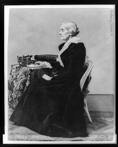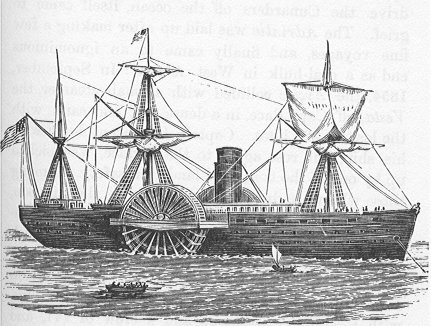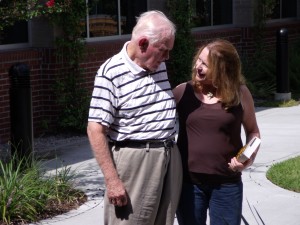In the words of Sofia Petrillo, picture it: Magnolia (that’s in NJ), Thursday, November 11, 2009, sometime between 9 and 9:30 pm. I’ve just arrived home from my third evening on campus at Rutgers, Camden and have one thing on my mind, to get ahead in my Looking for Whitman work. I have caught up in my other classes, except for finishing King Lear. I am determined to finish my digital museum and my two new Whitman assignments by Sunday so I can focus on Shakespeare on Monday…..
I sit down at my computer and decide to check my email before beginning my project, only to find a note from a professor informing me that a paper I turned in a week ago was done incorrectly. For the next five minutes I hesitate, think about calling it quits forever – this has been the most grueling semester I have ever had – change my mind and immediately get to work on correcting the assignment.
I am now sitting on my couch, hunched over my coffee table, where my lap top happily resides, (I don’t recommend this….it kills the back and cuts off circulation to the legs.) when I realize it is 10 pm. I have been working feverishly for only about 20 minutes, and although I don’t make it a habit to watch TV while working, I absolutely must turn it on. I have allowed myself one last television indulgence since going back to school 4 years ago and it is on NOW. So, I turn the volume down half way and go back to my paper. I am pretty much tuning out the show I so desperately wanted to see…..and it’s the semi final episode of the season! I am so much more interested in getting this paper done. (This little problem has really put a glitch in my exiting weekend plans!!!!!) I ended up working on the paper until 2 am, so I cannot tell you if this actually happened during my show or some other time during those four hours at the computer, but all of a sudden my brain registers something my ears have vaguely heard. Could this really be happening? My eyes dart from my computer screen to the TV. Low and behold this is really happening! Despite how fatigued they are, my ears have not deceived me. It is not an illusion. What I am hearing is “Pioneers! O Pioneers!” and what I am seeing is the Levi commercial that we were just discussing in class the night before. Who would have thunk it? I stop, watch and attempt to register this timely event somewhere in my now overly taxed brain. Writing about Walt Whitman and watching “his” commercial on TV at the same time; I could not have planned that in a millennium.
So what about the commercial? My initial reaction is one of anger. That is probably because the beginning of the ad is violent and confusing. At first it appears that the characters are unsuccessfully attempting to fight off something scary, and then they appear to be running from something. In the end they are just playing. While the commercial’s cast of characters is made up of young people, and Walt is addressing his “tan-faced children” in the first line of the poem, that is where the similarity between the two ends. By the fourth stanza of the poem Walt is telling his audience that they need to take up where their predecessors left off, “We take up the task eternal, and the burden andthe lesson.” In the commercial the first three stanzas where Walt is beckoning to the youth to follow him, are read. The fourth stanza, which is where Walt lets the youth know his intentionn for calling them, is completely skipped, then the second and third lines of the fifth stanza are read and it is over. There are twenty-six stanzas in the poem. How could anyone come to understand Walt’s full meaning in the poem from this ad? How could anyone have the opportunity to appreciate what he was trying to do with his work by watching this one minute and three second video? They cannot. Unless the poem is read in its entirety it is not possible to understand its meaning. The advertisers took a portion of this poem and attempted to fit it into their agenda. They sorely missed the mark. The visuals do not match Walt’s words or meaning.
The producers take a beautiful poem and mock it. The characters in the commercial are not forging onward through uncharted territories, they are playing. They are not depicted as doing anything to move this land forward or take their places in society as the previous generation winds down, as Walt is calling them to do in his poem. In stanza twenty-three he specifically tells his readers that the call on their lives is not for fun, but for hard work.
Not for delectations sweet,
Not the cushion and the slipper, not the peaceful and the studious,
Not the riches safe and palling, not for us the tame enjoyment,
Pioneers! O pioneers! (Kaplan 374)
Another aspect of this commercial that is a mockery to Walt is the use of his work to sell clothing. One of the characteristics about Wlat that has come through in my reasearch is that he was never interested in clothing as it pertained to the latest fashion or what was popular at the time. I don’t see him as one who whould be honored to be linked to an advertisement for clothing. Possibly if the Levis were presented in such a way that linked them to blazing uncharted territory, building a better world, or fighting against oppression he could appreciate his words being used to sell them.
As my grandmother used to say, Walt is probably turning over in his grave. Anyone who compares what he was doing with his work to this commercial and says that television advertisers are the new poets is degrading him and his life.
I find one good thing about his ad; it gave me material for a Looking for Whitman blog post.



